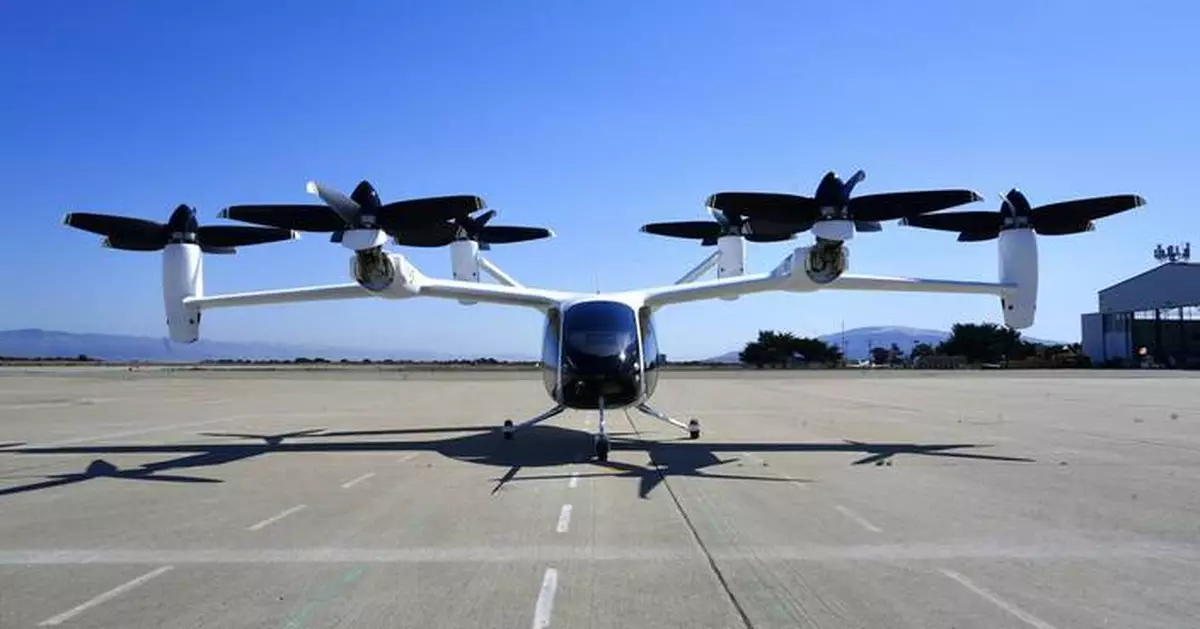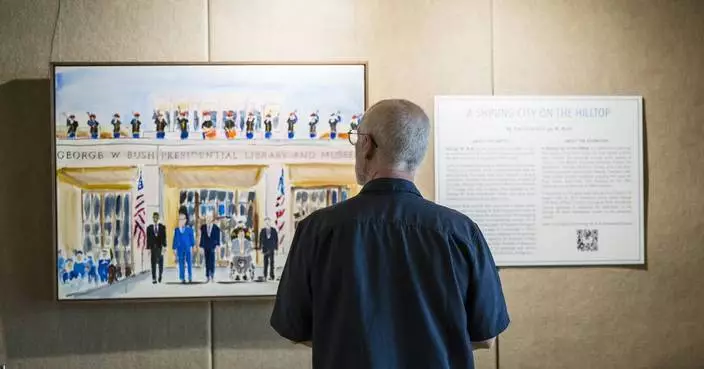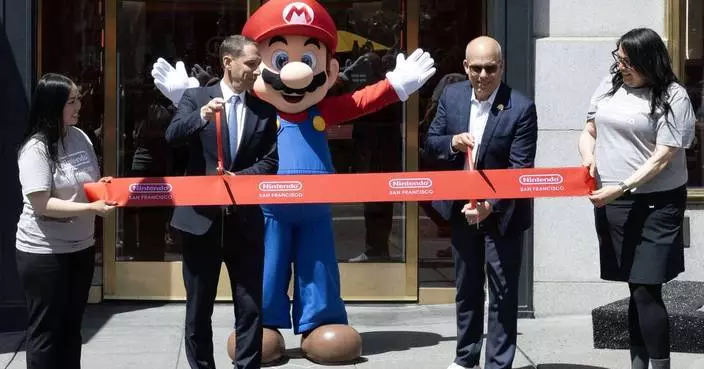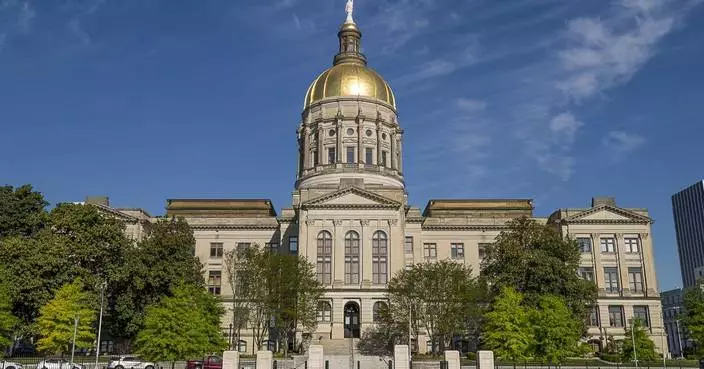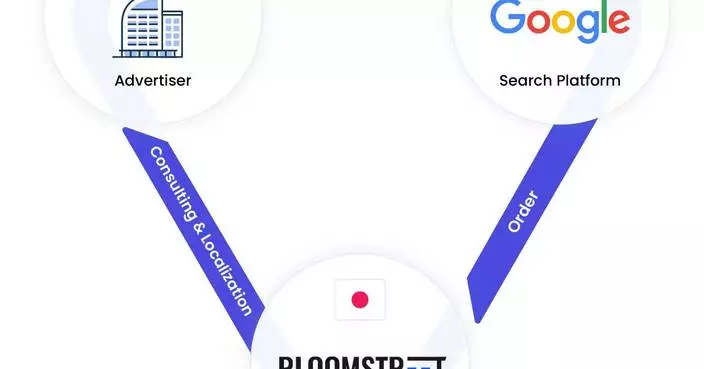SAN FRANCISCO (AP) — When he was still a boy making long, tedious trips between his school and his woodsy home in the mountains during the 1980s, JoeBen Bevirt began fantasizing about flying cars that could whisk him to his destination in a matter of minutes.
As CEO of Joby Aviation, Bevirt is getting closer to turning his boyhood flights of fancy into a dream come true as he and latter-day versions of the Wright Brothers launch a new class of electric-powered aircraft vying to become taxis in the sky.
Click to Gallery
A phone displays a Joby Aviation mobile app that consumers could use to take a flight in an "electric vertical takeoff and landing" eVTOL aircraft. San Carlos, Calif. on Monday, Oct. 7, 2024. (AP Photo/Terry Chea)
Archer Aviation CEO Adam Goldstein speaks at the company's headquarters in San Jose, Calif. on Friday, Dec. 13, 2024. (AP Photo/Terry Chea)
Joby Aviation employees assemble parts for an "electric vertical takeoff and landing" eVTOL aircraft in Marina, Calif. on Monday, Oct. 7, 2024. (AP Photo/Terry Chea)
An "electric vertical take-off and landing" aircraft built by Joby Aviation flies over an airfield in Marina, Calif. on Monday, Oct. 7, 2024. (AP Photo/Terry Chea)
A Joby Aviation employees works on the assembly of an "electric vertical takeoff and landing" eVTOL aircraft in Marina, Calif. on Monday, Oct. 7, 2024. (AP Photo/Terry Chea)
JoeBen Bevirt, CEO of Joby Aviation, stands next to an "electric vertical take-off and landing" aircraft, also known as an eVTOL, in Marina, Calif. on Monday, Oct. 7, 2024. (AP Photo/Terry Chea)
An "electric vertical take-off and landing" aircraft built by Joby Aviation lands at an airfield in Marina, Calif. on Monday, Oct. 7, 2024. (AP Photo/Terry Chea)
JoeBen Bevirt, CEO of Joby Aviation, stands next to an "electric vertical take-off and landing" aircraft, also known as an eVTOL, in Marina, Calif. on Monday, Oct. 7, 2024. (AP Photo/Terry Chea)
An "electric vertical take-off and landing" aircraft built by Joby Aviation is parked at an airfield in Marina, Calif. on Monday, Oct. 7, 2024. (AP Photo/Terry Chea)
The aircraft — known as "electric vertical take-off and landing vehicle, or eVTOL — lift off the ground like a helicopter before flying at speeds up to 200 miles per hour (322 kilometers per hour) with a range of about 100 miles (161 kilometers). And these craft do it without filling the air with excessive noise caused by fuel-powered helicopters and small airplanes.
“We are just a few steps from the finish line. We want to turn what are now one- and two-hour trips into five-minute trips,” Bevirt, 51, told The Associated Press before a Joby air taxi took off on a test flight in Marina, California — located about 40 miles south from where he grew up in the mountains.
Archer Aviation, a Silicon Valley a Silicon Valley company backed by automaker Stellantis and United Airlines, has been testing its own eTVOLs over farmland in Salinas, California, where a prototype called “Midnight” could be seen gliding above a tractor plowing fields last November.
The tests are part of the journey that Joby Aviation and other ambitious companies that collectively have raised billions of dollars are taking to turn flying cars into more than just pie-in-the-sky concepts popularized in 1960s-era cartoon series, “The Jetsons,” and the 1982 science fiction film, “Blade Runner.”
Archer Aviation and nearby Wisk Aero, with ties to aerospace giant Boeing Co. and Google co-founder Larry Page, are also at the forefront in the race to bring air taxis to market in the United States. Joby has already formed a partnership to connect its air taxis with Delta Air Lines passengers while Archer Aviation has lined up a deal to sell up to 200 of its aircraft to United Airlines.
Flying taxis have made enough regulatory inroads with the U.S. Federal Aviation Administration to result in the recent creation of a new aircraft category called “powered lift,” a step that the agency hadn't taken since helicopters were introduced for civilian use in the 1940s.
But there are more regulatory hurdles to be cleared before air taxis will be allowed to carry passengers in the U.S., making Dubai the most likely place where eVTOLs will take commercial flight — perhaps by the end of this year.
“It’s a tricky business to develop a whole new class of vehicles,” said Adam Lim, director of Alton Aviation Consultancy, a firm tracking the industry's evolution. “It is going to be like a crawl, walk, run situation. Right now, I think we are still crawling. We are not going to have the Jetsons-type reality where everyone will be flying around everywhere in the next two to three years.”
China is also vying to make flying cars a reality, a quest that has piqued President-elect Donald Trump's interest in making the vehicles a priority for his incoming administration during the next four years.
If the ambitions of eVTOL pioneers are realized in the U.S., people will be able to hop in an air taxi to get to and from airports serving New York and Los Angeles within the next few years.
Because its electric taxis can fly unimpeded at high speeds, Joby envisions transporting up to four Delta Air Lines passengers at a time from New York area airports to Manhattan in about 10 minutes or less. To start, air taxi prices almost certainly will be significantly more that the cost of taking a cab or Uber ride from JFK airport to Manhattan, but the difference could narrow over time because eVTOLs should be able to transport a higher volume of passengers than ground vehicles stuck in traffic going each way.
“You will see highways in the sky,” Archer Aviation CEO Adam Goldstein predicted during an interview at the company's San Jose, California, headquarters. “There will be hundreds, maybe thousands of these aircraft flying in these individual cities and it will truly change the way cities are being built.”
Investors are betting Goldstein is right, helping Archer raise an additional $430 million late last year from a group that included Stellantis and United Airlines. The infusion came shortly after a Japanese automaker poured another $500 million into Joby to bring its total investment in that company to nearly $900 million.
Those investments were part of the $13 billion that eTVOL companies have raised during the past five years, according to Alton Aviation.
Both Joby Aviation and Archer Aviation went public in 2021 through reverse mergers, opening up another fundraising avenue and making it easier to recruit engineers with the allure of stock options. Both companies have been able to attract workers away from electric automaker Tesla and rocket maker SpaceX and, in Archer's instance, raiding the ranks of Wisk Aero.
The Wisk defections triggered a lawsuit accusing Archer of intellectual property theft in a dispute that was resolved with a 2023 settlement that included an agreement for the two sides to collaborate on some facets of eTVOL technology.
Before going public, Joby also acquired eTVOL technology developed by ride-hailing service Uber in an $83 million deal that also brought those two companies together as partners.
But none of the deals or technological advances have stopped the losses from piling up at the companies building flying cars. Joby, whose roots date back to 2009 when Bevirt founded the company, has sustained $1.6 billion in losses since its inception while Archer has amassed nearly $1.5 billion in losses since its founding in 2018.
While they moved to commercial air taxi services, both Joby and Archer are trying to bring in revenue by negotiating contracts to use their eTVOLs in the U.S. military for deliveries and other other short-range missions. Archer has forged a partnership with Anduril Industries, a military defense technology specialist founded by Oculus headset inventor Palmer Luckey, to help it win deals.
The uncertain prospects have left both companies with relatively low market values by tech industry standards, with Joby's hovering around $7 billion and Archer's $6 billion.
But Bevirt sees blue skies ahead. “eVTOLs are going to transform the way we move,” he said. “It’s a dramatically better way to get around. Seeing the world from the air is better than being stuck in the traffic on the interstate.”

A phone displays a Joby Aviation mobile app that consumers could use to take a flight in an "electric vertical takeoff and landing" eVTOL aircraft. San Carlos, Calif. on Monday, Oct. 7, 2024. (AP Photo/Terry Chea)
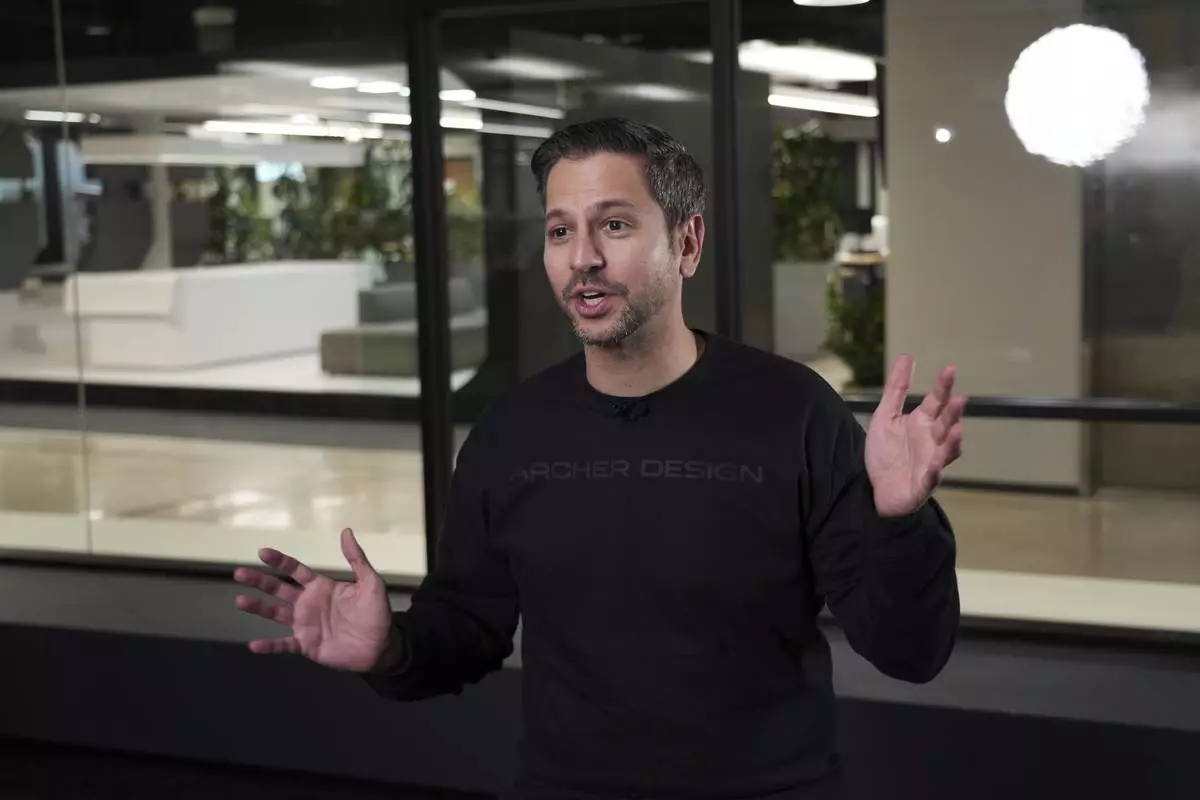
Archer Aviation CEO Adam Goldstein speaks at the company's headquarters in San Jose, Calif. on Friday, Dec. 13, 2024. (AP Photo/Terry Chea)
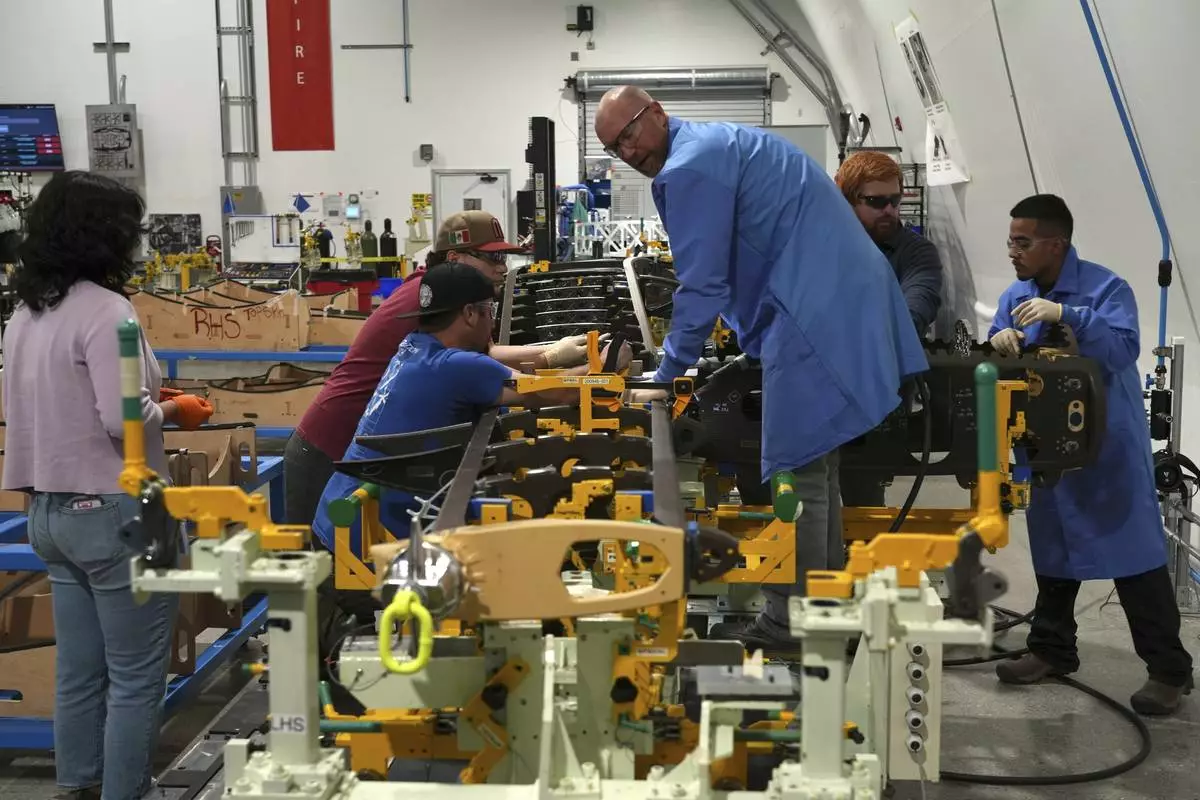
Joby Aviation employees assemble parts for an "electric vertical takeoff and landing" eVTOL aircraft in Marina, Calif. on Monday, Oct. 7, 2024. (AP Photo/Terry Chea)
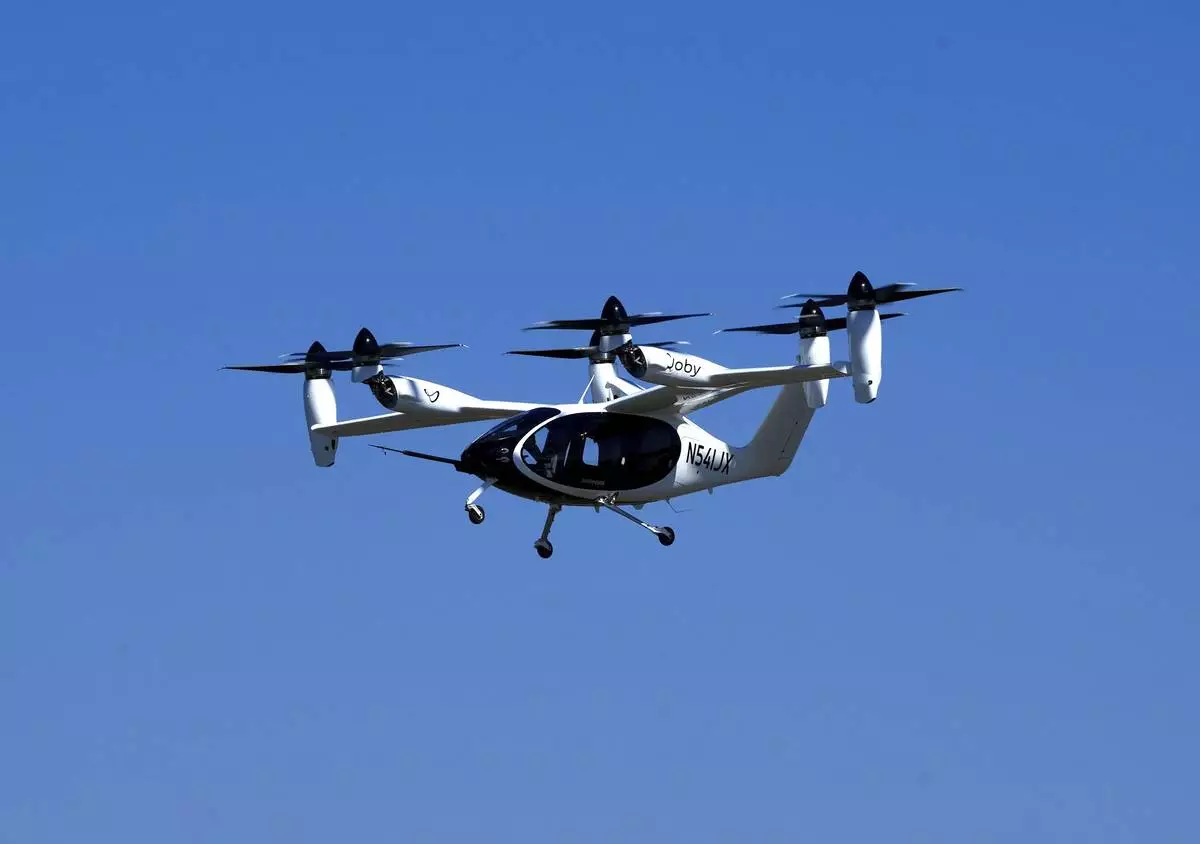
An "electric vertical take-off and landing" aircraft built by Joby Aviation flies over an airfield in Marina, Calif. on Monday, Oct. 7, 2024. (AP Photo/Terry Chea)
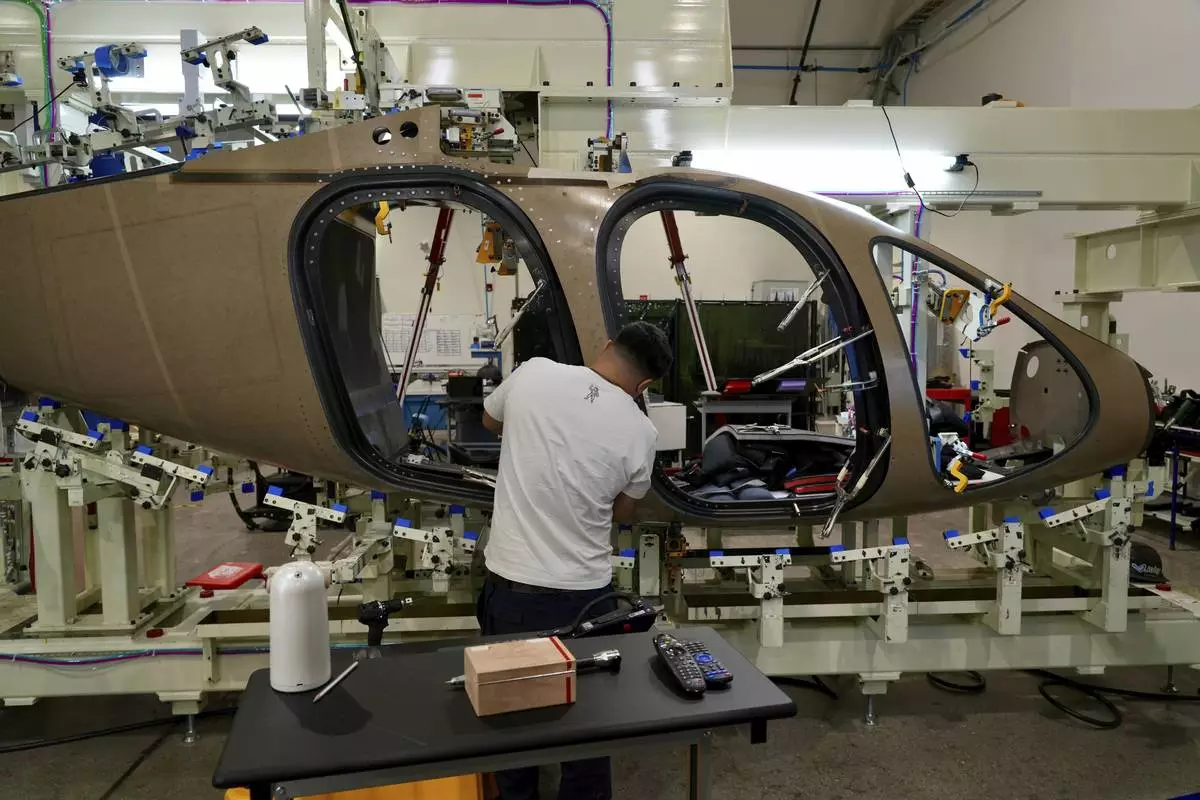
A Joby Aviation employees works on the assembly of an "electric vertical takeoff and landing" eVTOL aircraft in Marina, Calif. on Monday, Oct. 7, 2024. (AP Photo/Terry Chea)
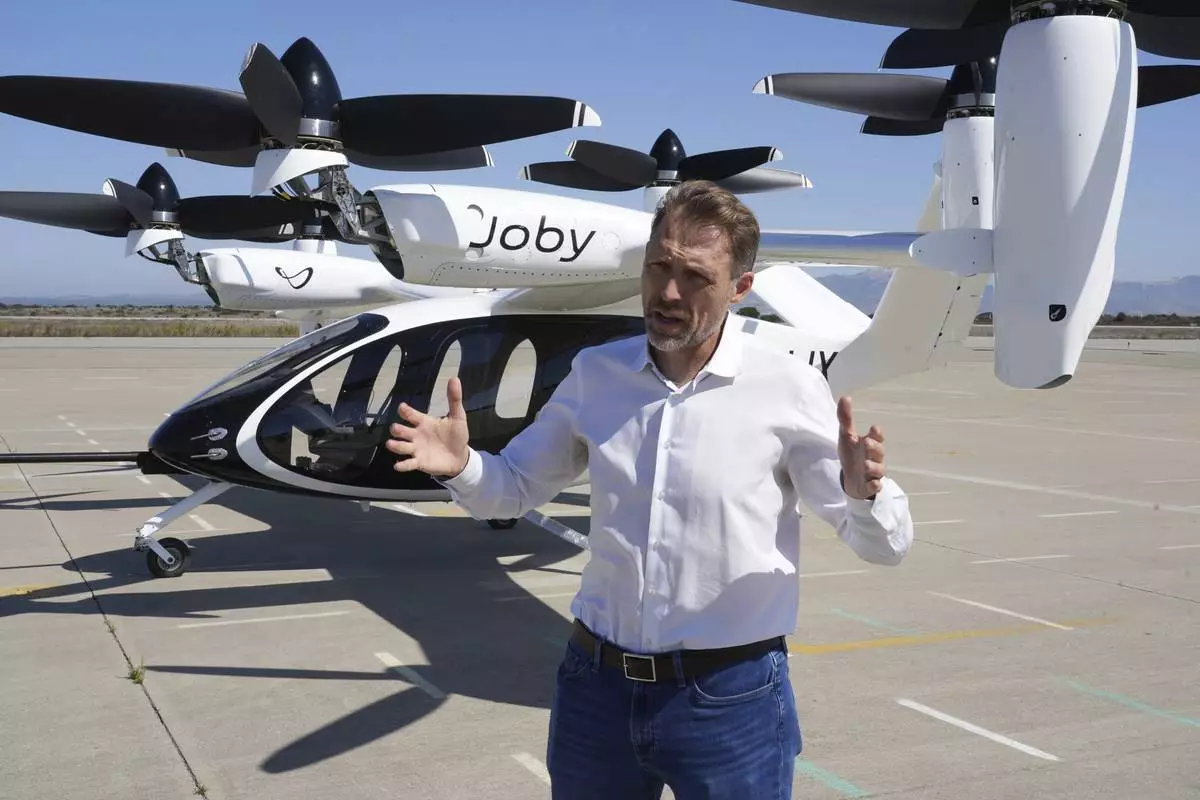
JoeBen Bevirt, CEO of Joby Aviation, stands next to an "electric vertical take-off and landing" aircraft, also known as an eVTOL, in Marina, Calif. on Monday, Oct. 7, 2024. (AP Photo/Terry Chea)
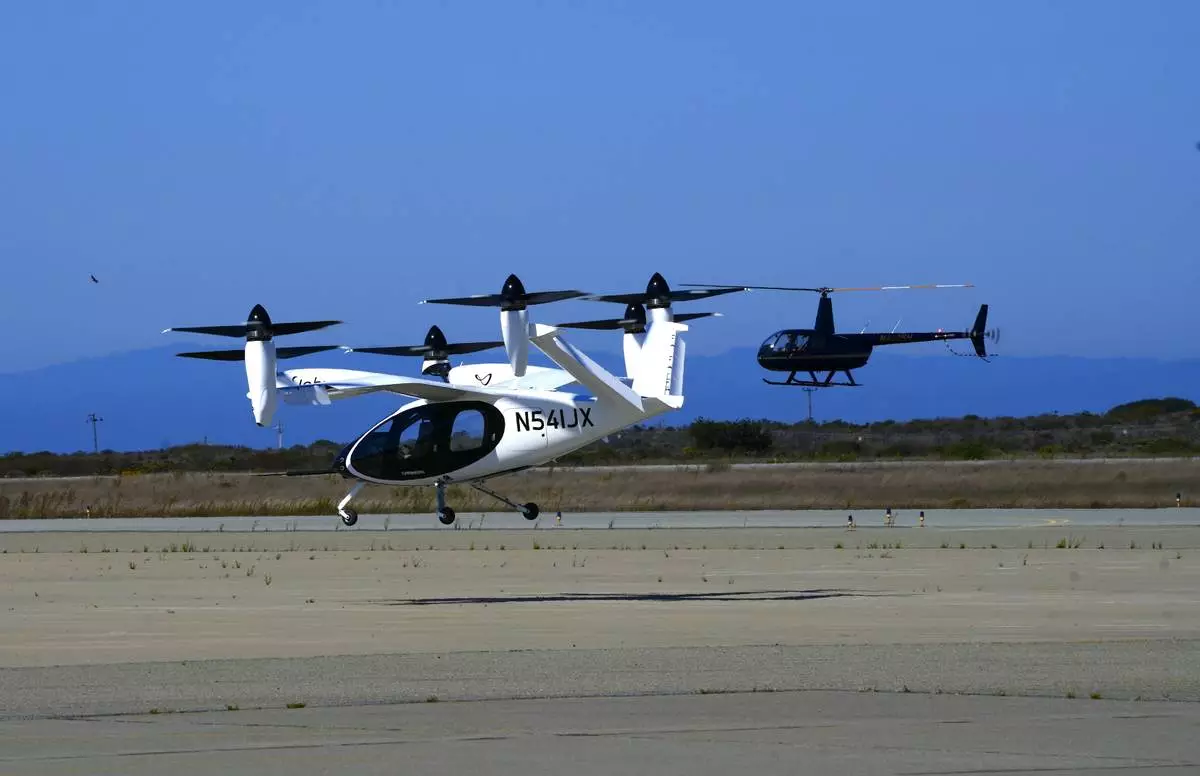
An "electric vertical take-off and landing" aircraft built by Joby Aviation lands at an airfield in Marina, Calif. on Monday, Oct. 7, 2024. (AP Photo/Terry Chea)
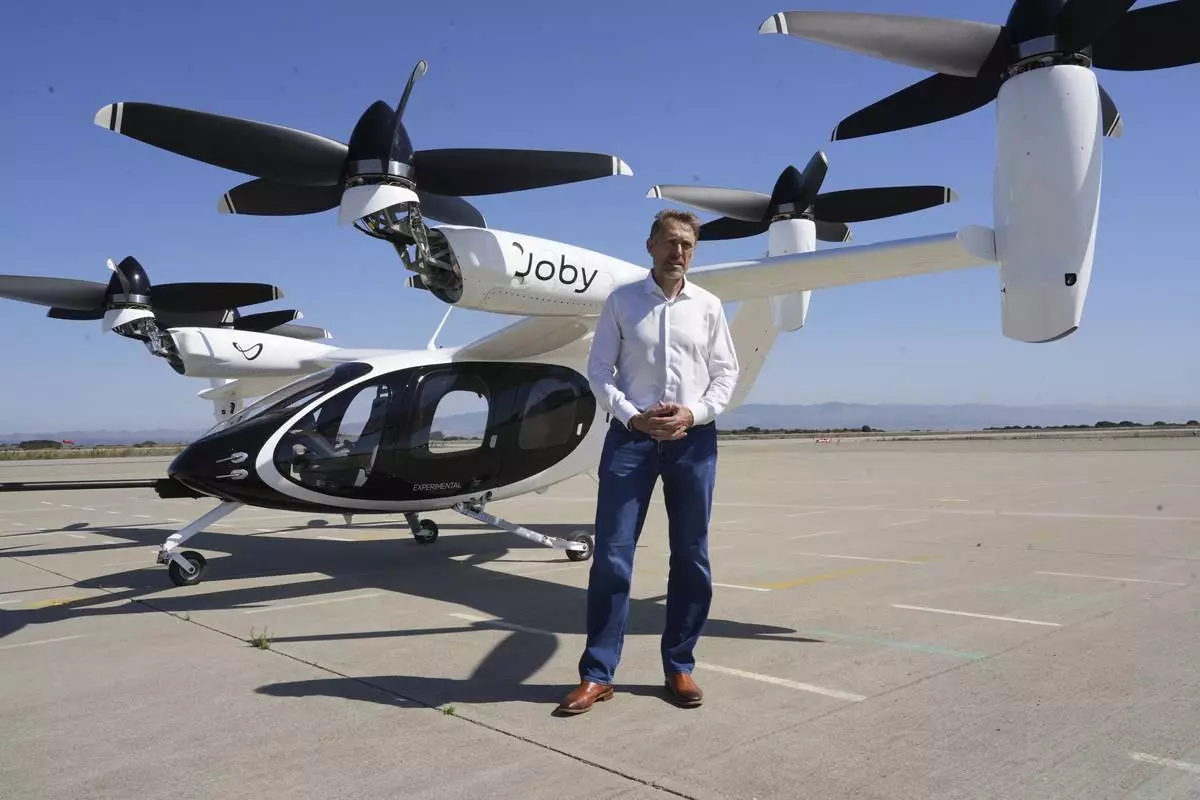
JoeBen Bevirt, CEO of Joby Aviation, stands next to an "electric vertical take-off and landing" aircraft, also known as an eVTOL, in Marina, Calif. on Monday, Oct. 7, 2024. (AP Photo/Terry Chea)
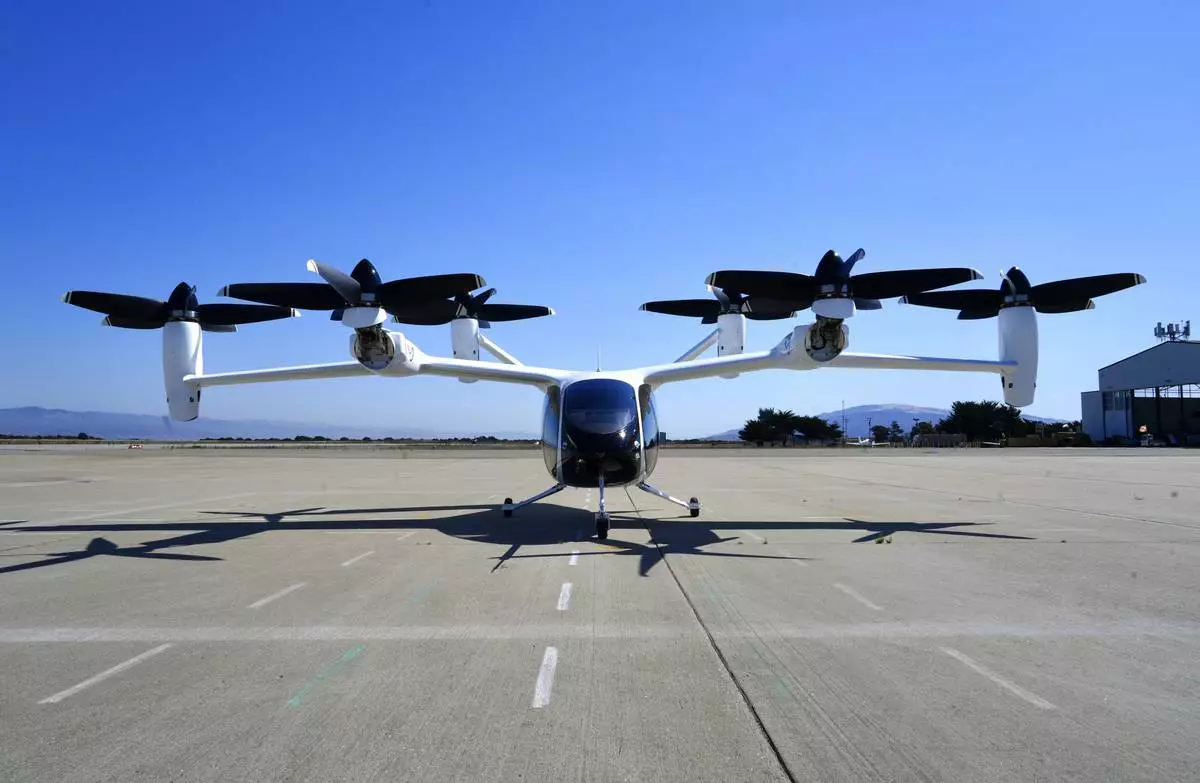
An "electric vertical take-off and landing" aircraft built by Joby Aviation is parked at an airfield in Marina, Calif. on Monday, Oct. 7, 2024. (AP Photo/Terry Chea)
BARCELONA, Spain (AP) — This was Lamine Yamal's season.
So it just had to be the teenage phenom who scored the decisive goal to clinch Barcelona's 28th Spanish league title.
And what a goal it was.
The 17-year-old struck the winner in Barcelona's 2-0 victory at crosstown rival Espanyol on Thursday when he slid past two defenders outside the area and whipped one his now trademark left-footed curlers into the corner of the net.
It was a perfect culmination to Yamal's last 10 months.
After helping Spain win the European Championship last summer, Yamal excelled for Barcelona this campaign with his goals, dribbling and playmaking as he confirmed his status as the next big star of global soccer. Along with Raphinha, Pedri and company, and Barcelona was unstoppable.
“I always try my best and today I was lucky it went in,” Yamal said. "I am very happy I could help the team and celebrate it.”
Fermín López ensured the win in stoppage time after Espanyol was reduced to 10 men in the 80th when Leandro Cabrera saw a direct red for hitting Yamal in the stomach while disputing a ball.
Barcelona won the title with two rounds remaining. It completed a domestic double with the Copa del Rey title — treble if you add the Spanish Super Cup — and reached the Champions League semifinals in a fantastic first season for coach Hansi Flick.
Flick’s team virtually ended Madrid’s title defense when it beat its top rival 4-3 on Sunday, making it four of four clasico victories across all competitions this season.
Madrid's victory over Mallorca on Wednesday impeded Barcelona from winning the title without playing. But the Catalan club needed just two points from its final three games of the season.
Barcelona’s players danced briefly on the field to celebrate while sprinklers wet them with water.
“You don’t win a league every day and we have to enjoy this and give it the value it has,” said Barcelona midfielder Pedri after completing his 200th game for his club at age 22.
Barcelona dominated the domestic competitions, winning 15 and drawing two of its league games in 2025. Toss in the cups, and the only tiny blemish was coming oh-so-close to reaching the Champions League final before it fell in gut-wrenching fashion at Inter Milan.
Yamal credited his coach for inspiring a core of players who had won nothing last season under Xavi Hernández.
“We are thankful for what Xavi have us, but it is true that coach (Flick) has given us a new life,” Yamal said.
Looking back on his arrival in the summer, Flick said that he had instilled a “positive” attitude in his team and it had adapted well to his style of play that requires a high defensive line and all-in pressing.
“Barcelona has to win titles and three titles is really great,” Flick said. “I suffered a bit after the game in Milan, but after winning three titles I am very happy and the club is too.”
Espanyol outplayed its wealthier rival in the first half. But Urko González shot wide on a counterattack early on and Javi Puado couldn’t beat Wojciech Szczesny in a one-on-one opportunity.
But Yamal's great shot in the 53rd minute put Barcelona in control. Espanyol goalkeeper Joan García, who is linked to a move to a big club this summer, including Barcelona, dove but couldn’t reach the perfectly placed shot.
On Yamal’s goal, Pedri said: “He scored two goals like that today in practice. We are fortunate to have him on our side.”
Espanyol needed to a good result from the derby as it hopes to stay out of the relegation fight. Espanyol remained in 16th place and five points from the drop zone.
The game was briefly paused by the referee in the opening minutes when a car rammed into a crowd outside the RCDE Stadium, injuring several people. Authorities said it was an accident and not related to the game.
AP soccer: https://apnews.com/hub/soccer

Barcelona fans celebrate in the street after their team won the Spanish La Liga soccer championship in Barcelona, Spain, Thursday, May 15, 2025. (AP Photo/Emilio Morenatti)

Barcelona's Hector Fort celebrates at the end of the Spanish La Liga soccer match between Barcelona and Espanyol at Lluis Companys Olympic Stadium in Barcelona, Spain, Thursday, May 15, 2025. (AP Photo/Joan Monfort)

Barcelona players celebrate at the end of the Spanish La Liga soccer match between Barcelona and Espanyol at Lluis Companys Olympic Stadium in Barcelona, Spain, Thursday, May 15, 2025. (AP Photo/Joan Monfort)

Barcelona players celebrate after a goal during a Spanish La Liga soccer match between Espanyol and Barcelona in Barcelona, Spain, Thursday, May 15, 2025. (AP Photo/Jose Breton)

Barcelona's Fermin Lopez, celebrates after scoring his side's second goal during a Spanish La Liga soccer match between Barcelona and Espanyol at Lluis Companys Olympic Stadium in Barcelona, Spain, Thursday, May 15, 2025. (AP Photo/Joan Monfort)

Barcelona's Lamine Yamal reacts after scoring during a Spanish La Liga soccer match between Espanyol and Barcelona in Barcelona, Spain, Thursday, May 15, 2025. (AP Photo/Jose Breton)

Espanyol's Antoniu Roca, left, attempts a shot at goal in front of Barcelona's Gerard Martin during a Spanish La Liga soccer match between Barcelona and Espanyol at Lluis Companys Olympic Stadium in Barcelona, Spain, Thursday, May 15, 2025. (AP Photo/Joan Monfort)

Espanyol's Javi Puado, left, attempts a shot at goal in front of Barcelona's Andreas Christensen during a Spanish La Liga soccer match between Barcelona and Espanyol at Lluis Companys Olympic Stadium in Barcelona, Spain, Thursday, May 15, 2025. (AP Photo/Joan Monfort)

Barcelona's Lamine Yamal, left, celebrates with his teammates after scoring his side's opening goal during a Spanish La Liga soccer match between Barcelona and Espanyol at Lluis Companys Olympic Stadium in Barcelona, Spain, Thursday, May 15, 2025. (AP Photo/Joan Monfort)

Barcelona's Lamine Yamal spits out water as he warms up prior to a Spanish La Liga soccer match between Barcelona and Espanyol at Lluis Companys Olympic Stadium in Barcelona, Spain, Thursday, May 15, 2025. (AP Photo/Joan Monfort)

Barcelona's Lamine Yamal drinks water as he warms up prior to a Spanish La Liga soccer match between Barcelona and Espanyol at Lluis Companys Olympic Stadium in Barcelona, Spain, Thursday, May 15, 2025. (AP Photo/Joan Monfort)

Barcelona's Lamine Yamal, center, celebrates after scoring his side's opening goal during a Spanish La Liga soccer match between Barcelona and Espanyol at Lluis Companys Olympic Stadium in Barcelona, Spain, Thursday, May 15, 2025. (AP Photo/Joan Monfort)

Barcelona's Lamine Yamal, left, runs with the ball past Espanyol's Carlos Romero during a Spanish La Liga soccer match between Barcelona and Espanyol at Lluis Companys Olympic Stadium in Barcelona, Spain, Thursday, May 15, 2025. (AP Photo/Joan Monfort)

Barcelona's Lamine Yamal, left, celebrates with his teammate Alejandro Balde after scoring his side's opening goal during a Spanish La Liga soccer match between Barcelona and Espanyol at Lluis Companys Olympic Stadium in Barcelona, Spain, Thursday, May 15, 2025. (AP Photo/Joan Monfort)

Barcelona's Lamine Yamal attempts a shot at goal to scores his side's opening goal during a Spanish La Liga soccer match between Barcelona and Espanyol at Lluis Companys Olympic Stadium in Barcelona, Spain, Thursday, May 15, 2025. (AP Photo/Joan Monfort)











